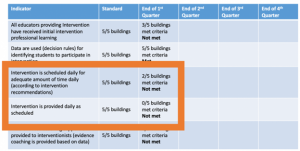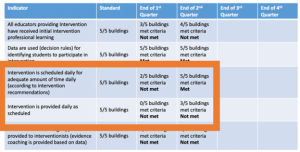Coaching Effectiveness Data Use – Case Example
Author(s): SISEP
Publication Date: 2019
Frameworks: Drivers
Resource Type: Read
Example of a District Implementation Team Using Coaching Effectiveness Data
In the Evergreen school district, systems coach, Ali, provides professional learning and coaching for Building Implementation Teams around their Multi-tiered System of Support (MTSS) framework. Building Implementation Teams (BITs) report quarterly to Ali and the District Implementation Team (DIT) on adherence to district expectations and coaching satisfaction. See Figure 1 for adherence to district intervention delivery expectations.
Data indicated that:
- None of the buildings were providing daily interventions for students and only 2 of the 5 buildings had time allotted for interventions in the schedule
- 95% of BIT members reported that the coaching support provided positively impacted their team’s ability to lead implementation on the coaching satisfaction survey
Figure 1: Evergreen district-wide expectations for intervention delivery Quarter 1 report

Lessons Ali and the District Implementation Team learned:
- Make no assumptions about ease of application of training content: Ali and the DIT thought it would be simple for teams to schedule using the guidelines they provided in training. However, they realized any piece of content from a training session may require support. Coaches should follow up on application of specific content after training and provide support as needed.
- Differentiate the coaching support: Ali met with all BITs and discovered a variety of reasons why they needed more support with scheduling including: a) BITs with no experience at master scheduling who hadn’t accounted for schedules of those supporting teacher intervention delivery (e.g., special education teachers, educational assistants), b) BITs having difficulty working around schedules for specials (e.g., music, art) when specialists were shared across buildings, and c) BITs who hadn’t ensured training for those supporting intervention. Coaching needed to look different for each BIT.
- Collect data that is useful for decision making: Coaching satisfaction surveys were returning very positive results on all items on a regular basis. Ali and the DIT determined the surveys may provide more useful feedback if they include items related to application of specific content from the professional learning sessions instead of items related to overall satisfaction.
Ali provided coaching support and, by the next quarter, all buildings had adjusted their schedules and 3 of the buildings were making progress toward ensuring intervention was being provided for the indicated amount of time planned (see Figure 2).
Figure 2: Evergreen district-wide expectations for intervention delivery Quarter 2 report

